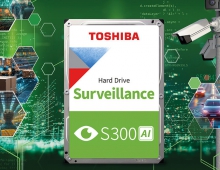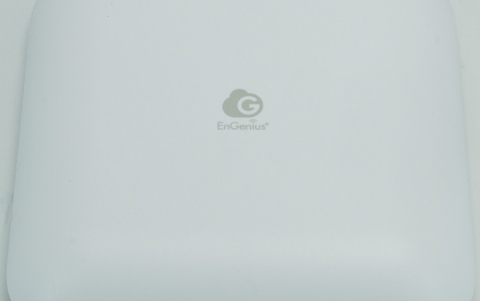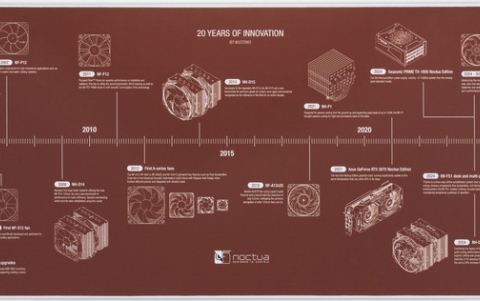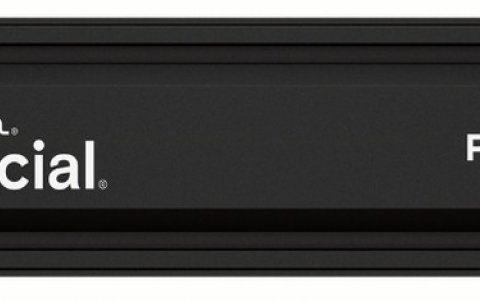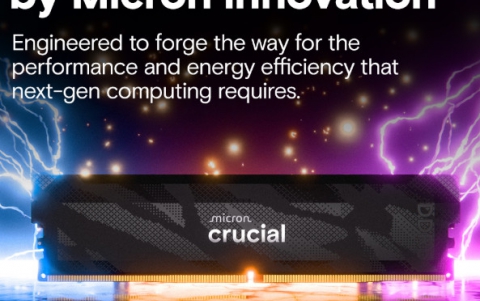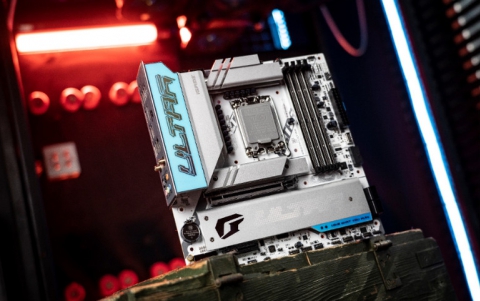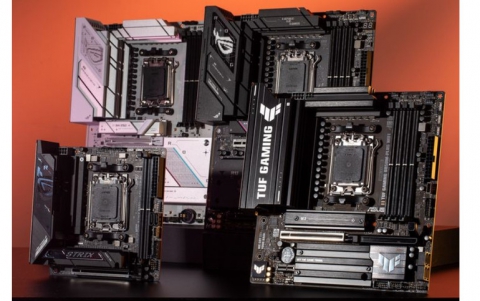Lexar Professional 1066x CF 128GB Vs. Toshiba Exceria Pro C501 128GB
4. Tests
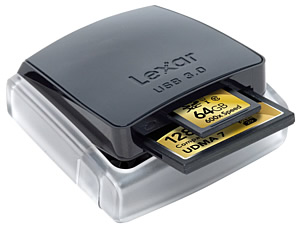 Both 1066x 128GB cards were put through a series of benchmark tests in the Lexar Professional USB 3.0 Dual-Slot Reader (UDMA 7)
USB 3.0 card reader, ( 48$ sold separately).
Both 1066x 128GB cards were put through a series of benchmark tests in the Lexar Professional USB 3.0 Dual-Slot Reader (UDMA 7)
USB 3.0 card reader, ( 48$ sold separately).
The USB 3.0 reader leverages SuperSpeed USB 3.0 technology to deliver high-speed file transfer from card to computer, with a USB interface speed up to 500MB/s. It supports CompactFlash (including UDMA 7), SD, SDHC, SDXC, and SD UHS-I and UHS-II memory cards.
The reader has the ability to read from both card slots simultaneously, and it also allows for file transfer from one card to another.
It boasts a pop-up mechanism that protects the card slots by allowing you to close the reader when not in use.
Crystal Disk Mark Benchmark measures the speeds at which your storage device reads and writes in both compressible (0F ill/1Fill) and random, mostly incompressible, data. We run the benchmark twice, using 0Fill data first, and then proceeding to test with random data.
The latest version of Crystal Disk (v.5.1.2) adds measurements (Seq Q32T1, 4K Q32T1) with multi queues and threads, as you see below:
- Seq Q32T1: Sequential (Block Size=128KiB) Read/Write with multi Queues & Threads
- 4K Q32T1: Random 4KiB Read/Write with multi Queues & Threads
- Seq: Sequential (Block Size=1MiB) Read/Write with single Thread
- 4K: Random 4KiB Read Write with single Queue & Thread
In order to offer results consistent to previous reviews, we have included the results from both Crystal Disk Mark v3.0.4 (read/write with single Queue & Thread) and the new Crystal Disk Mark v5.1.2 (read/write with multi Queues & Threads).
Each test was set to run 5 times:
Lexar Professional 1066x CompactFlash |
Toshiba
EXCERIA PRO - C501 |
|
| v.3.0.4 | 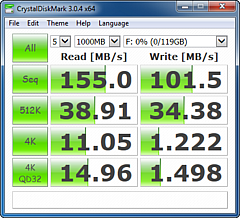 |
 |
| v.3.0.4, 0Fill |  |
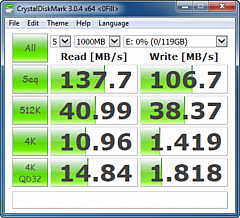 |
| v5.1.2 |  |
 |
| v5.1.2, 0Fill | 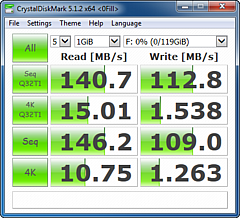 |
 |
The differences in the performance of both CompactFlash cards are very small:
- The Lexar Professional 1066x CompactFlash 128GB has a small lead (~ 10-15 MB/s) over the Toshiba EXCERIA PRO - C501 128GB in the sequential read /write tests with single Queue & Thread.
- Toshiba's card seems to be a slightly faster in read tests with sequential multi Queues & Threads
- The Lexar Professional 1066x CompactFlash gave its maximum sequential read speed of 155MB/s in single Queue & Thread
- The Toshiba EXCERIA PRO - C501 128GB card topped at 161.5 MB/s in the sequential read test with multi Queues & Threads.
Below you see a sequential reading test for each card using the HD Tach RW benchmark.
Lexar's card tended to read faster than 130MB/s speed through out the test, and its average speed in the end was 135.7 MB/s.
The Toshiba EXCERIA PRO maintained an overall stable speed throughout its capacity but the average read speed was slower than 's Lexar's card, at 118.2 MB/s.
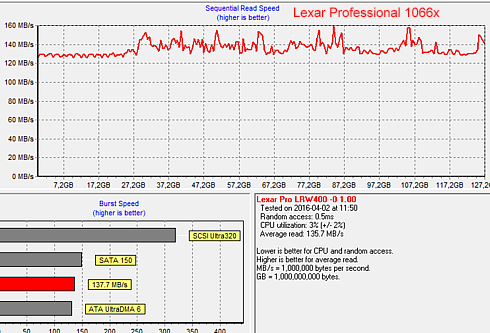

ATTO Disk Benchmark performs file transfers ranging from 0.5 KB to 8192 KB. ATTO can be adjusted to do overlapped I/O, in a variety of queue depths. The test was run with the default runs of 0.5KB through 8MB transfer sizes with the total length being 256MB and QD4.

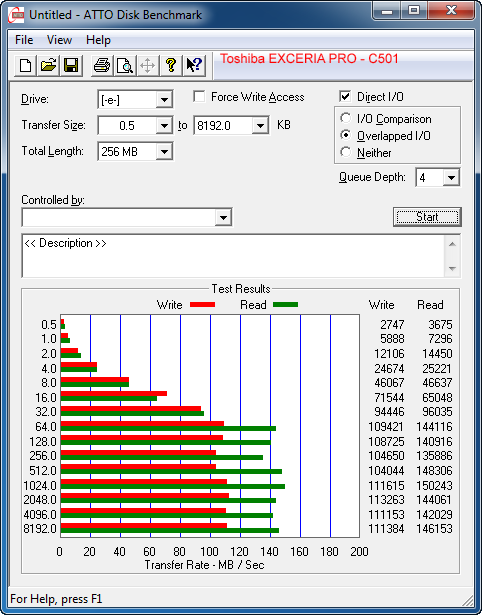
Both cards go head to head in both the read and write tests across the various file transfers. The Toshiba card gets a small lead with files larger than 256K.

Lexar's card was slightly faster with write transfers of 128K-1MB files, but again, the differences are almost negligible at about 4MB/s:

We also tested both cards using the Canon 5Ds and the Canon 1D X cameras. The Exceria Pro 1066x 128GB performed nearly the same as the Lexar Professional 1066x.
Write speed (MB/s) |
||
| Canon 5Ds | Canon 1D X | |
| Lexar Professional 1066x CompactFlash | 99.1 |
92.6 |
| Toshiba EXCERIA PRO - C501 | 98.4 |
93.2 |



